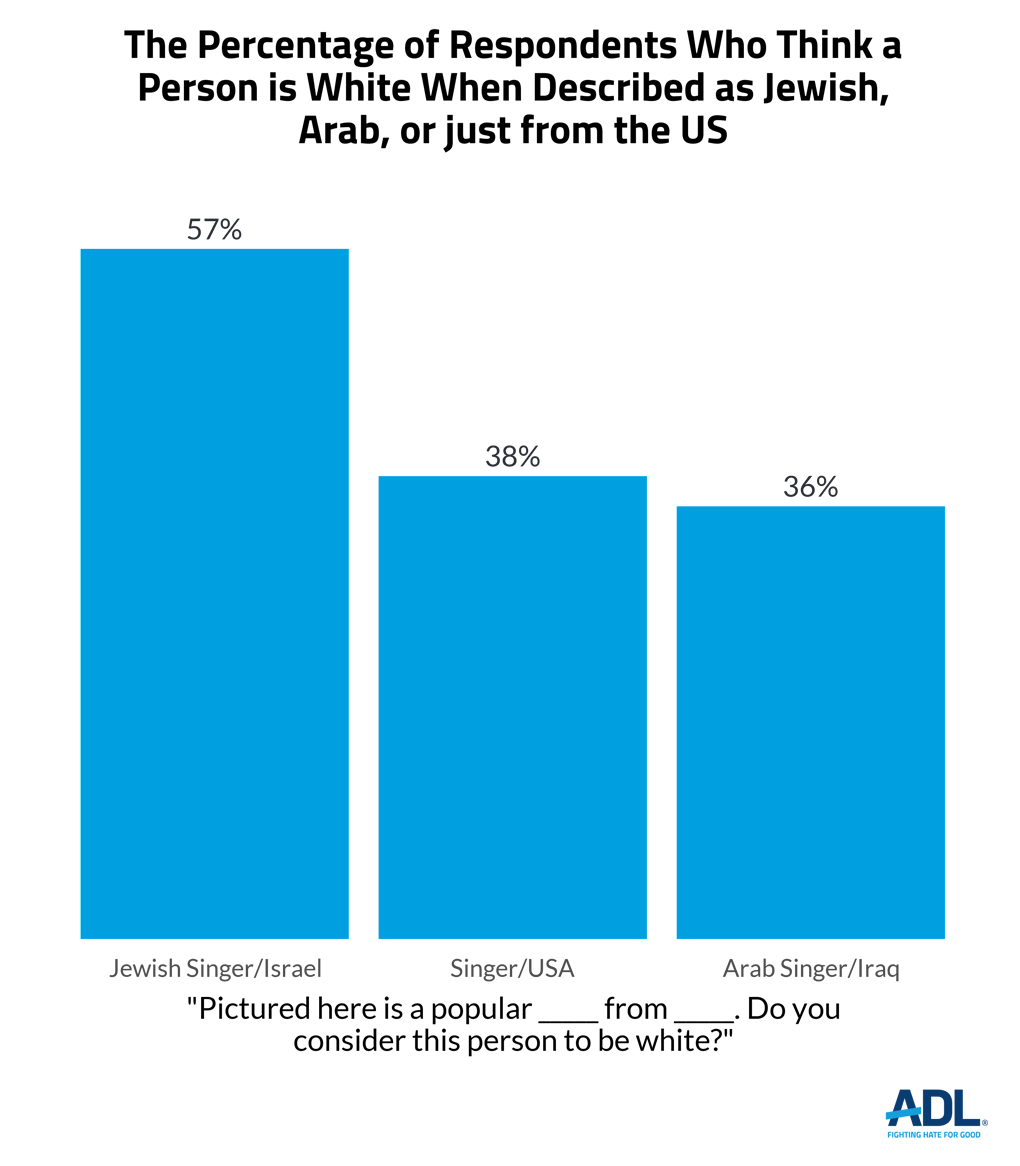The ADL just released some interesting new data its compiled on antisemitism. I'm still working my way through it, but I did want to flag one experiment it did which to my mind led to some fascinating results on the interplay of Jewishness and Whiteness.
Before I talk about the study, some background. Many -- myself included, in my "White Jews: An Intersectional Approach" -- have hypothesized that in the contemporary American context Jewishness is viewed as amplifying Whiteness. That is, whereas in years past Jews were seen as paradigmatically non-White, today Jews are seen as paradigmatically White -- so much so, that even persons who might otherwise be identified as non-White will instead be coded as White once it becomes known they're Jewish. I quote one writer as arguing explicitly that "the simple attribute of being Jewish functions to whiten Sephardic and other non-white Jews,” and suggest that "All Jews are 'White Jews' in this sense—non-White Jews are deemed White in their Jewishness."
From this, we can generate a hypothesis:
Hypothesis 1: All else equal, respondents will be more likely to perceive someone they know to be Jewish as White than a person whom they know not to be Jewish.
But what is the impact of this Jews-as-White association?
Here, we can think of two stories, which I'll dub the "traditional" and "revisionist" accounts.
The traditional account suggests that as Jews became perceived as White, it opened doors and diminished antisemitic prejudice. Being seen as part of the "in" group ameliorated antisemitic otherization and reduced antisemitic stereotype, as Jews became viewed by the White majority as "one of us".
The revisionist account, by contrast, suggests that Jews being perceived as White licenses certain forms of antisemitism. As Jews become seen as White, they're no longer viewed as a marginalized group worthy of protection and instead become "fair game" for otherization and discrimination that would allegedly not be tolerated if they remained recognized as a distinct minority.
These two accounts aren't necessarily competitive. In most renditions, the revisionist account is sequential to the traditional one: that is, the argument goes that in the mid-20th century "Whitening" Jews may have been a boon for Jews, but in the 21st century (with the rise of multiculturalism and "woke" politics) it has become a liability. Or one might believe that both hypothesis are true for different sorts of persons: White people viewing Jews as White diminishes antisemitism (since it implies viewing Jews as part of their group); while non-White people viewing Jews as White will enhance antisemitism (since it implies Jews are not part of their group and are part of the dominant White group)
So we have two more hypotheses:
Hypothesis 2a [traditional]: Perceiving Jews as White will result in comparatively lesser levels of antisemitic stereotyping.
Hypothesis 2b [revisionist]: Perceiving Jews as White will result in comparatively greater levels of antisemitic stereotyping.
Keeping this in mind, here's what the ADL did. First, they showed subjects the following photo of a racially-ambiguous person:
Some subjects were told the subject was Israeli Jewish, some were told he was Iraqi Arab, and some were told he was American. They were then asked to answer whether the pictured person was "White" or not.
But what was the result of this perception? Hypothesis 2a (the traditional account) suggests that viewing the person as White should be associated with reduced antisemitic views (he's an "insider", "one of us", or a member of a respected, preferred group). Hypothesis 2b (the revisionist account) suggests the opposite: that viewing the person as White should be associated with increased antisemitic views (he's a member of the dominant caste, an oppressor).
The study found that for White respondents, viewing the pictured person as White was associated with significantly lower levels of antisemitic sentiment -- supporting the traditional account. But perhaps this is not too surprising -- the sorts of White persons invested in denying Jewish Whiteness may be especially prone to antisemitic aggression. We might think that non-White persons, for whom being White is of course not an assertion of commonality, would push in the opposite direction. But the study found that, for non-White respondents, viewing Jews as White had no relationship to the prevalence of antisemitic attitudes. This significantly weakens the evidentiary support for the revisionist hypothesis even in its supposedly strongest turf (21st century non-White respondents).
I'll want to dive into this in more detail, of course. But what a fascinating contribution!



